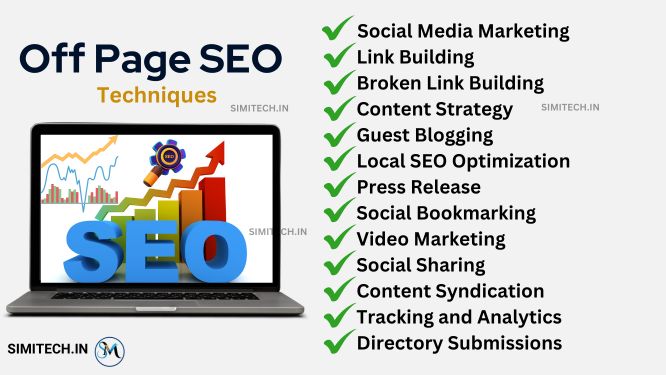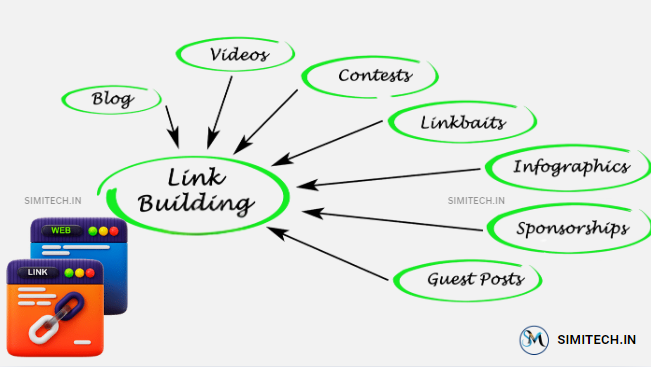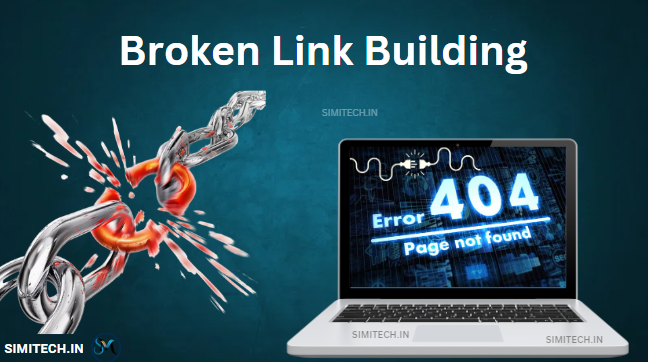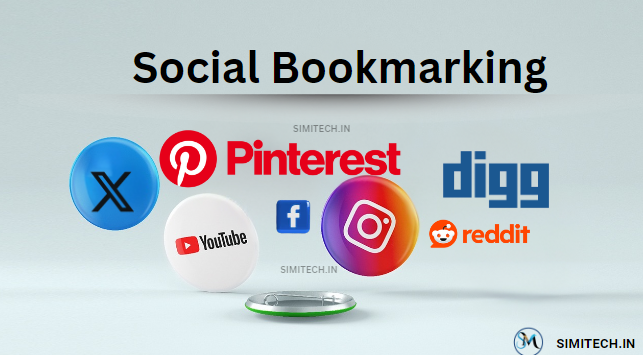Search engine optimization (SEO) is an essential part of digital marketing. It ensures that your website appears in search engine results, drives traffic, and improves rankings. SEO is divided into two parts: on-page SEO and off-page SEO. While on-page SEO focuses on optimizing elements within your website, off-page SEO deals with activities outside of your website that affect its ranking on search engines. In this article, we will learn about off-page SEO services, their importance, different techniques, and how they can benefit your online presence
What is Off-Page SEO?
Off-Page SEO refers to activities done outside your website to improve its ranking on search engine results pages (SERPs). It focuses on building trust, authority, and relevance through external signals. The main components of off-page SEO include backlinks (links from other websites pointing to yours), social media engagement, brand mentions, and guest blogging. Quality backlinks from reputable sites are especially crucial as they act like endorsements for your content. Off-page SEO helps search engines understand your website’s popularity and credibility, enhancing its visibility. While it complements on-page SEO, off-page efforts mainly target factors that happen beyond your website’s control.
How does off-page SEO work?
Off-page SEO works by improving your website’s visibility and authority through activities outside of your website. This includes obtaining high-quality backlinks from other trusted sites, promoting content on social media, and connecting with influential people or online communities. These actions signal to search engines that your website is trustworthy and valuable. The more reputable websites link to your content or mention your brand, the higher your site ranks in search engine results. Off-page SEO helps build trust, increase traffic, and ultimately improve your website’s search engine rankings and online presence.
20 Best Off-Page SEO Techniques
Off-page SEO is essential for improving your website’s authority, trust, and search engine rankings. It involves activities performed outside your website to enhance its online reputation. Here are 20 of the best off-page SEO techniques.

Social Media Marketing: Social media marketing involves promoting your content on platforms like Facebook, Twitter, Instagram, and LinkedIn. While social signals may not directly impact rankings, sharing content on social media increases its reach, drives traffic, and enhances brand visibility. Off-page SEO services use social media to build relationships with your audience, generating engagement and encouraging backlinks.

Link Building: Link building is the core of off-page SEO. It involves acquiring backlinks from other websites, signaling to search engines that your content is valuable. Quality backlinks from authoritative sites boost your site’s domain authority and help you rank higher in search results. Off-page SEO services employ various strategies like guest posting, resource link building, and broken link building to gain these backlinks.

Broken Link Building: This technique involves finding broken or dead links on other websites and suggesting your content as a replacement. This helps you get backlinks while helping website owners fix broken links on their sites. It’s a win-win situation that enhances your SEO efforts.

Content Strategy: Content marketing plays a pivotal role in off-page SEO by creating valuable, shareable content that attracts backlinks. High-quality content such as blog posts, infographics, videos, and case studies are more likely to be shared across the web, resulting in more backlinks and improved search rankings. Off-page SEO services help develop a content marketing strategy to promote your content on various platforms.

Influencer Outreach: Influencer outreach involves partnering with influencers or bloggers who have a large following in your industry. These influencers can help promote your brand, share your content, and link to your website. Off-page SEO services identify relevant influencers to collaborate with, leveraging their credibility to boost your site’s authority and reach.

Guest Blogging: Guest blogging is a powerful technique where you write articles for other blogs in your industry. In return, you get backlinks to your website. This not only builds your backlink profile but also helps you establish authority and engage with a new audience.

Forum and Community Participation: Participating in forums and online communities relevant to your industry allows you to engage with your target audience. By answering questions and providing valuable insights, you build trust and authority. Platforms like Quora, Reddit, and niche-specific forums are excellent for fostering discussions that can generate backlinks and traffic to your website.

Local SEO Optimization: Local SEO is essential for businesses targeting customers in specific geographic areas. Off-page SEO services help optimize your website for local search queries by building local citations (mentions of your business name, address, and phone number) and getting listed on local directories like Google My Business, Yelp, and Bing Places. This increases your visibility in local search results.

Social Bookmarking: Social bookmarking involves saving and sharing your website’s pages on popular bookmarking sites like Pinterest, Reddit, and Digg. It helps generate traffic and exposure for your website. Off-page SEO services leverage social bookmarking to promote your content and improve SEO by encouraging shares and interactions.

Press Release : Press releases are a powerful tool for gaining visibility, especially for newsworthy events like product launches or company announcements. Off-page SEO services distribute press releases to news outlets, blogs, and PR websites, generating media coverage and authoritative backlinks that help improve your site’s rankings.

Directory Submissions: Directory submissions involve submitting your website to online directories like Yellow Pages, DMOZ, or niche-specific directories. These directories help your website gain backlinks and improve its visibility in search engines. However, it’s important to choose reputable directories to avoid harming your site’s reputation with low-quality links.

Podcasting and Guest Appearances: Podcasts are a great way to reach new audiences and build authority in your field. Appearing on podcasts as a guest or starting your own podcast can lead to mentions and backlinks from podcast websites. This can help increase your visibility and boost your SEO rankings.

Video Marketing: Video marketing is an increasingly important component of off-page SEO. Videos can drive traffic, improve engagement, and enhance your brand’s visibility. By sharing videos on platforms like YouTube, Vimeo, or social media, you can increase the chances of your content being shared and linked back to, improving your SEO performance.

Social Sharing: Social sharing involves encouraging users to share your content on their social media profiles. When content is shared across various platforms, it increases its visibility and potential for backlinks. Off-page SEO services create strategies to optimize content for social sharing, making it easy for users to share and interact with your content.

E-book and Whitepaper Distribution: Creating and distributing e-books and whitepapers is a strategic way to gather backlinks. By offering valuable resources, you encourage other websites and bloggers to link to your content. Off-page SEO services help create informative e-books and whitepapers and distribute them on relevant platforms to increase traffic and backlinks.

Content Syndication: Content syndication involves republishing your content on third-party websites. This increases the visibility of your content and gives you a chance to reach a wider audience. It also provides backlinks to your website, which contributes positively to SEO. Ensure that content is syndicated properly with proper attribution to avoid duplicate content issues.

Tracking and Analytics: Finally, effective off-page SEO requires ongoing tracking and analysis. Off-page SEO services use tools like Google Analytics, Ahrefs, and SEMrush to track the effectiveness of various strategies. By measuring key metrics such as traffic, backlink growth, and social shares, they ensure that the off-page SEO efforts are yielding the desired results.

Why Is Off-Page SEO Important?
Off-page SEO is important because it helps improve your website’s visibility, authority, and trustworthiness in the eyes of search engines like Google. While on-page SEO focuses on optimizing your website’s content and structure, off-page SEO shows how other websites and online platforms perceive your site. Here are key reasons why off-page SEO is crucial.
- Higher Search Engine Rankings: Search engines prioritize websites that are popular and trusted. Off-page activities like getting backlinks from reputable sites signal that your website is valuable, helping it rank higher in search results.
- Improves Website Authority: Backlinks from high-quality sources act as endorsements. The more credible your backlinks, the more authoritative your site appears, which increases trust with users and search engines.
- Drives More Traffic: Off-page strategies like social media promotion, guest blogging, and influencer collaborations drive traffic from various sources, not just search engines.
- Builds Brand Awareness: Being active off-page boosts your presence across the internet. When people see your brand mentioned on trusted sites, social media, or forums, it builds awareness and credibility.
- Enhances Trust and Credibility: Off-page efforts like positive reviews, backlinks, and brand mentions increase user trust. Websites with a strong off-page reputation are more likely to be perceived as reliable and authoritative.
- Encourages Organic Growth: As your website gains authority and traffic through off-page SEO, search engines naturally rank it higher. This creates a positive feedback loop, where better rankings lead to more visibility and traffic.
On-Page SEO vs Off-Page SEO
On-page SEO and off-page SEO are two key parts of search engine optimization. On-page SEO focuses on optimizing elements within your website to improve its ranking, such as content, keywords, title tags, meta descriptions, internal linking, and mobile-friendliness. It ensures your site is user-friendly and relevant to search queries.
Off-page SEO, on the other hand, involves activities outside your website to boost its authority and trustworthiness. This includes building backlinks, social media marketing, influencer outreach, and managing online reviews.
While on-page SEO makes your site technically strong and relevant, off-page SEO helps improve its reputation and visibility in search engines.
Conclusion
Off-page SEO is a vital part of any SEO strategy, helping to improve your website’s authority, visibility, and reputation through external signals. The 20 key features discussed in this article, including link building, content marketing, influencer outreach, and local SEO optimization, highlight the diverse strategies that off-page SEO services employ to improve your website’s rankings. By leveraging these strategies effectively, businesses can increase organic traffic, build brand credibility, and ultimately achieve sustainable growth in the digital landscape.
Recommended Articles
- Free Keyword Research Tools For Bloggers and Content Creators
- Top 20 Off-Page SEO Services to Boost Your Website Rankings
- 15 best Chrome extensions for SEO
- Top 20 Highest Salary Jobs : Lucrative Careers with Best Salaries - 5 April 2025
- Types of Operating System (OS): Features,Types And Uses - 5 April 2025
- 15 Features of Operating System You Should Know - 4 April 2025




